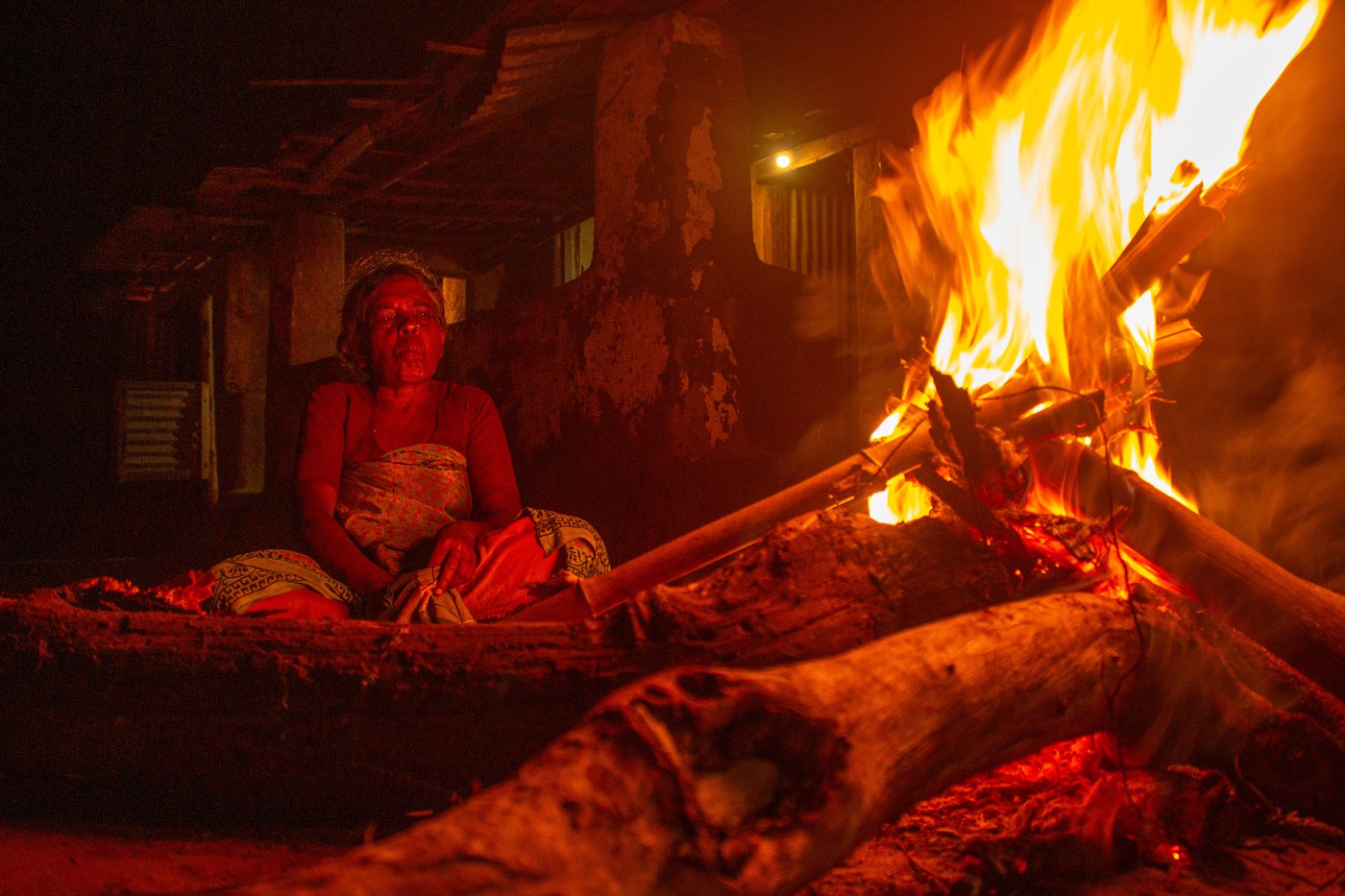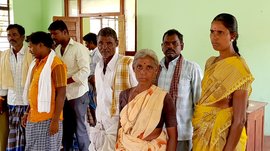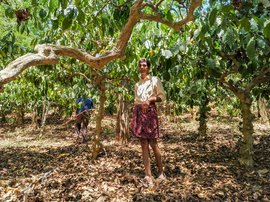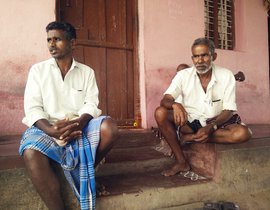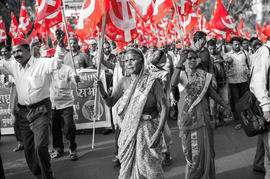In the Mudumalai Tiger Reserve the eyes rest but the ears don't. Birds and animals communicate in sounds we can't quite understand. Amidst these are the languages of various tribes who live in Tamil Nadu's Nilgiris mountains.
“Nalaiyavoduthu” [How are you]? ask the Bettakurumbas. The Irulars say “sandhakithaiya?”
It’s the same question, different greetings.


Left: A Hoopoe bird after gathering some food. Right: After a dry spell in the forests, there is no grass for deer to graze
The music of the animals and people in this southern region of the Western Ghats contrasts sharply with the noise of vehicles and machines elsewhere. These are the sounds of home.
I live within the Mudumalai Tiger Reserve in Pokkapuram (officially Bokkapuram) village, on a small street called Kurumbar Padi. From late February to early March, this serene place transforms into a bustling town akin to thoonga nagaram [city that never sleeps], a name also used for the big city of Madurai. This change is due to the temple festival dedicated to the goddess Pokkapuram Mariamman. For six days, the town pulses with crowds, festivities, and music. Yet, when I think of life in my oor [village], this is only part of the story.
This isn’t a story about the tiger reserve or my
village. It's about someone who plays a
defining role in my life—a woman who single-handedly raised five children after
her husband abandoned them. This is the story of my mother.


Left: Amma stops to look up at the blue sky in the forest. She was c ollecting cow dung a few seconds before this. Right: Bokkapuram is green after the monsoons, while the hills take on a blue hue
*****
My official name is K. Ravikumar, but among my people, I am known as Maaran. Our community refers to itself as Pettakurumbar, although officially we are listed as Bettakurumba.
The heroine of this story, my amma [mother], is called ‘Methi’, both officially and by our people. My appa [father] is Krishnan, known by our community as Kethan. I am one of five siblings: my eldest sister, Chithra (Kirkaali in our community); my elder brother, Ravichandran (Maadhan); my second eldest sister, Sasikala (Keththi); and my younger sister, Kumari (Kinmari). My elder brother and sister are married and live with their families in Paalavaadi, a village in Tamil Nadu’s Cuddalore district.
My earliest memories are of either amma or appa taking me to the anganwadi , a government-run childcare centre, where I experienced all kinds of emotions with my friends –happiness, joy, anger, and sorrow. At 3 p.m., my parents would pick me up and we would go home.
Before alcohol took over his life, my appa was a very affectionate man. Once he started drinking, he turned irresponsible and violent. "The bad company that accompanies him is the reason for his behaviour," my mother would say.


Left: My amma, known by everyone as Methi. Right: Amma is seated outside our home with my sister Kumari and my niece, Ramya
My first recollection of trouble at home was when appa came home drunk one day and started yelling at amma . He assaulted her and insulted her parents and siblings – who were also with us at the time – with the most offensive language. Although forced to listen to him, they tried to ignore his words. These outbursts became a daily occurrence.
I distinctly remember an incident when I was in Class 2. As usual, appa came home drunk and angry, hit amma , then my siblings and me. He threw all our clothes and belongings onto the street, screaming at us to get out of his house. That night, we clung to our mother on the street, like young animals seek warmth from their mothers during the winter.
Since GTR Middle School – the tribal government institution we went to – had boarding and food facilities, my elder brother and sister decided to stay there. During those days, it seemed like all we had in surplus were our cries and tears. We continued to stay in our home, while appa was the one to move out.
We were always on tenterhooks, not knowing when the next fight would erupt. One night, appa 's drunken rage escalated into a physical fight with amma 's brother. Appa , wielding a knife, tried to slit my uncle's hands. Fortunately, the knife was too blunt to cause serious damage. Others in the family intervened, attacking appa . In the chaos, my younger sister, held by amma , fell and hurt her head. I stood there, cold and helpless, unable to process what was happening.
The next day, the front yard was splattered with the reddish-black blood stains of my uncle and appa . At midnight, my father staggered home and dragged me and my sister out of my grandfather's house, taking us to his tiny room amidst the fields. A few months later, my parents separated for good.


Left: My mother cutting dry wood with an axe. This is used as firewood for cooking. Right : The soft glow of the kerosene lamp helps my sister Kumari and my niece Ramya study, while our amma makes rice
At the family court in Gudalur, my siblings and I expressed our wish to stay with our amma. For a while, we lived happily with our maternal grandparents, whose home was on the same street as our parents' house.
Our happiness was short-lived as we ran into tough times. Food was starting to become a problem. The 40 kgs of ration my grandfather was entitled to wasn't enough for all of us. Most days, my grandfather slept on an empty stomach to ensure we ate. Desperate, he brought home prasadham (sacred food) sometimes from the temples to fill our stomachs. That's when amma decided to go for labour work.
*****
Amma dropped out of school in Class 3 as her family was unable to finance her education anymore. She spent childhood taking care of her younger siblings, and at 18 she was made to marry my father.
Appa collected firewood for the canteen in a large coffee estate located 10 kilometres away from Pokkapuram, called Singara village – in Gudalur block of the Nilgiris.
Nearly everyone in our area worked there. While
they were married, my mother stayed home to care for us. After their
separation, she joined the Singara coffee estate as a daily wage worker,
earning Rs. 150 a day.


Left: After quitting her work in the coffee estate, amma started working in her friends' vegetable garden. Right: Here, amma can be seen picking gourds
Every day, she went to work at 7 a.m., toiling through sun and rain. I’ve heard her co-workers say, “she never rests even during lunch breaks”. For almost eight years she ran the house with her earnings from this work. I have seen her coming back from work as late as 7:30 p.m., her sari completely drenched, shivering, with nothing but a wet towel to keep her covered. On such rainy days, our house would leak from various spots in the roof, and she would move from corner to corner, placing vessels to catch the water.
I would often help her start a fire, and then the family would sit by it and talk to each other every night up to 11.
On some nights, as we lay in bed, before we fell
asleep, she would talk to us, even sharing some of her hardships. At times, she
even cried as she recollected them. If
we began to cry hearing her stories, she would immediately joke to distract us.
Is there a mother in this world who can bear to see her children cry?

Before entering the forest, amma likes to stand quietly for a few moments to observe everything around her
Eventually, I enrolled in Sri Shanthi Vijiya High School in Masinagudi, run by my mother's employers. It was a school for the workers’ children. Going there it felt like jail. Despite my pleas, amma insisted I attend, even resorting to beatings when I was stubborn. Eventually, we moved from our grandparents’ home to my eldest sister Chithra’s marital home, a tiny two-room hut. My younger sister, Kumari, continued at the GTR Middle School.
When my sister Sasikala faced overwhelming pressure from her Class 10 exams, she quit school to handle household chores, giving my mother some respite. A year later, Sasikala got a job at a Tirupur textile company, visiting us once or twice a year. Her Rs. 6,000 monthly salary supported us for five years. Amma and I visited her every three months and she always gave us her savings. A year after my sister started working, my mother stopped working at the coffee estate. She dedicated a lot of her time to taking care of my elder sister, Chithra's child and the house.
I managed to finish my Class 10 at Sri Shanthi Vijiya High School and then moved to Kotagiri Government Boarding School for higher secondary. My mother sold dried dung cakes to fund my education, determined to provide better opportunities.
When appa left, he destroyed our home and disconnected the electricity. Without power, we used kerosene lamps made from liquor bottles, later replacing them with two sembu [copper] lamps. These lamps lit our lives for ten years until we finally regained electricity when I was in Class 12.
My mother endured a lot to restore our
electricity, battling bureaucracy and overcoming her own fear of electricity.
When alone, she switches off all the lights, using only her lamps. When I asked
her why she was so afraid of electricity, she recalled an incident she heard
where a woman died from an electric shock at Singara.


Left: Our old house twinkling under the stars. Right: Even after three years of having an electricity connection, there is only one light bulb inside our house
For my higher studies, I joined Arts College in the district headquarters, Udhagamandalam (Ooty). My mother took loans to cover my fees and bought me books and clothes. To repay these loans, she worked at vegetable farms and collected dried dung cakes. Initially, she sent me money but I soon started working part-time at a catering service to support myself and send money back home. My mother, now over 50, has never asked anyone for financial help. She is always ready to work, regardless of the job.
When
my eldest sister’s children were a bit older, my mother would leave them at the
anganwadi
to collect dried cow dung
from the wild fields. She collected dung all week and sold it for Rs. 80 a
bucket. She would start at 9 a.m. and return only by 4 p.m., surviving on wild
fruits like
kadalipazham
(a cactus
fruit) for lunch.
When
I asked how she remained energetic despite eating so little, she said, "In
my childhood, I ate lots of meat, leafy vegetables, and tubers from the forests
and wild fields. The food I ate in those days is the reason for my energy
today." She relishes wild leafy greens! I have seen my mother survive on a
rice gruel – just salt and hot water.
Surprisingly,
I have rarely heard
amma
say, "I
am hungry." She always seemed content just by watching us, her children,
eat.
At
home, we have three dogs, Diya,
Deo and Rasathi, and goats too – each one named after the colour of
their coat. These animals are as much a part of our family as we are.
Amma
cares for them just as she does for
us, and they reciprocate her endless love. Every morning, she feeds and waters
them, giving the goats leafy greens and boiled rice water.


Left: Amma collects and sells dry cow dung to the villagers. This helped fund my education. Right: The dogs and chickens are my mother's companions while she works in the house.


Left: Amma taking the goats into the forest to graze. Right: Amma looks after her animals as if they are her own children.
My mother is deeply religious, placing her faith in Jedasamy and Ayyappan more than in our traditional deity. Once a week, she deep cleans our house and visits the Jedasamy temple, sharing her inner struggles with these gods.
I've never seen my mother buy a saree for herself. Every saree she owns, only eight in total, was gifted by my aunt and elder sister. She wears them repeatedly, without any complaints or expectations.
Many villagers used to gossip about the constant fights in my family. Today, they find it astonishing that my siblings and I turned out so well despite our daily struggles. Local people now congratulate my mother for raising us without letting us feel the heavy burden she carried.
In retrospect, I am glad amma forced me to go to Sri Shanthi Vijiya High School. It’s where I learnt English. If not for that school and amma ’s persistence, my higher education would have been a struggle. I don't think I could ever repay my amma for all she has done. I am indebted to her for life.
At the end of every day, when
amma
is finally able to stretch her legs
and relax, I look at her feet. Feet that have laboured for years, no matter
what. Even if work demands her to stand in water for hours, as it quite often
does, her feet still resemble dry barren land with multiple cracks on them. It
is these cracks that brought us up.

No matter how much my mother works in the water, her cracked feet look like dry, barren land
